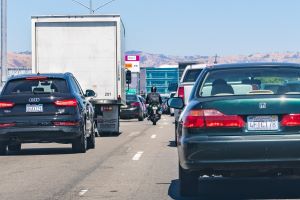Lane splitting and lane filtering are practices that have occupied a gray area in the law in many states as to whether or not these practices were legal. Several state legislatures across the United States have been taking up the issue in the past few years to shed clarity on the issue, however, due to the inconsistency of decisions, they seem to be making it harder for motorists and bikers traveling from state to state to know what the law is.
 Lane Splitting vs. Lane Filtering
Lane Splitting vs. Lane Filtering
Since lane splitting and lane filtering are often used interchangeably, it is important to define these terms as law sees them. Lane splitting is essentially driving between cars (on the dotted line) that are flowing at the regular flow of traffic whereas lane splitting is the practice of traveling between rows of stopped cars (on the dotted line between lanes) or very slow-moving cars. The difference is subtle but is sometimes distinguished because one is done to get ahead of a pack whereas the other is more accepted practice for safety reasons.
States Positions on Lane Splitting and Lane Filtering
California legalized lane splitting by motorcycles in 2017. In Montana, lane splitting is legal to do so when conditions are safe for motorcycles moving under 20 mph in traffic. Motorcycles may filter under 10 miles per hour. In Utah, lane splitting and filtering is allowed when traffic is moving between 0 and 15 miles per hour.
Lane splitting and filtering are currently illegal in Alabama, Alaska, Arizona, Colorado, Florida, Georgia, Hawaii, Idaho, Illinois, Indiana, Iowa, Kansas, Louisiana, Maine Maryland, Massachusetts, Michigan, Minnesota, Nebraska, Nevada, New Hampshire, New Jersey, New York, North Dakota, Oregon, Pennsylvania, Rhode Island, South Carolina, South Dakota, Tennessee, Texas, Vermont, Virginia, Washington, Wisconsin, and Wyoming.
The following states have no specific law addressing the issue: Arkansas, Connecticut, Delaware, Kentucky, Mississippi, Missouri, New Mexico, North Carolina, Ohio, Oklahoma, and West Virginia.
The Arguments For Lane Splitting and Lane Filtering
Proponents of lane filtering and lane splitting cite a number of environmental and safety reasons. On the environmental front, it saves gas if the motorcycle is not idling at low speeds behind a line of cars. From a safety perspective, a motorcycle is a sitting duck for serious injury from being rear-ended if stuck behind a line of stopped or slow-moving vehicles. Texas motorcycle accident lawyers see many of these cases involving serious injury because motorists just don’t notice the bike at the back of the line or misjudge the stopping distance. Additionally, slow-moving and stopped traffic leave motorcycle riders exposed to weather elements such as rain, sleet, snow or even just extreme heat. A record temperature of 119 degrees was recorded in Big Bend, Texas on June 23, 2023. Sitting on the hot pavement without a car between you and the road and no air conditioning just intensifies the Texas heat.
The Arguments Against Lane Splitting and Lane Filtering
People who oppose the law cite safety reasons as well. Let’s face it, the average automobile driver is not great at looking out for motorcycles in places where they are obvious such as an intersection. They especially are not expecting one to come zipping up in the same lane as the car. A slow-moving driver in the right lane may swerve toward the center line suddenly to get a look at the traffic head not expecting a motorcycle to be passing them at that exact moment. Even if the rider sees the car they may take evasive action resulting in another car getting side swiped by the motorcycle. These concerns account for why some states have placed maximum speeds on when lane splitting and lane filtering can occur.
In the end, what we have are lawmakers, many of whom do not ride motorcycles and do not share the concerns of bikers making the decisions for everyone. This resulted in different states reaching different conclusions about what rules and regulations should be followed when riding on their roads and highways. Those who ride motorcycles are left to the task of having to determine the rules state by state, not by what is the best or safest riding practice.
Bikers Beware
In states where the laws specifically prohibit lane splitting and lane filtering, if you are in an accident involving these maneuvers, the insurance company for the other driver will argue that this is a per se violation of the law and with use your actions to reduce your recovery or even prevent you from recovering at all regardless of how negligent the driver was at the time. In states where it is not specifically prohibited, there are often other laws that may still make the action a technical violation of the law. In any event, talk to a Houston motorcycle accident lawyer if you have questions about an accident you were involved in.


 Lane Splitting vs. Lane Filtering
Lane Splitting vs. Lane Filtering